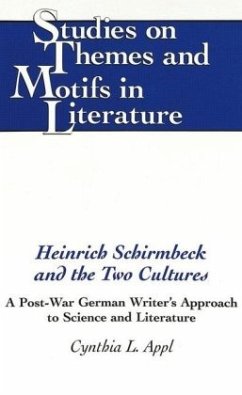Heinrich Schirmbeck (b. 1915), Germany's most prolific post-war writer on the subject of science and literature, sensed the diminishing relevance of literature in the scientific era. He developed a new poetics for the scientific age and anticipated the major ideas of the Two Cultures debate of C. P. Snow and F. R. Leavis. In his fiction, Schirmbeck explored both the promise and the dangers of science. In this, he predated more well-known German authors such as Dürrenmatt and Kipphardt. Schirmbeck, who wrestled with everything from nuclear weapons to cybernetics to genetic engineering, was simultaneously fascinated and frightened by the potential of science. It is a testament to the complexity of his work that he has been accused of utter pessimism, as well as naive hope.

